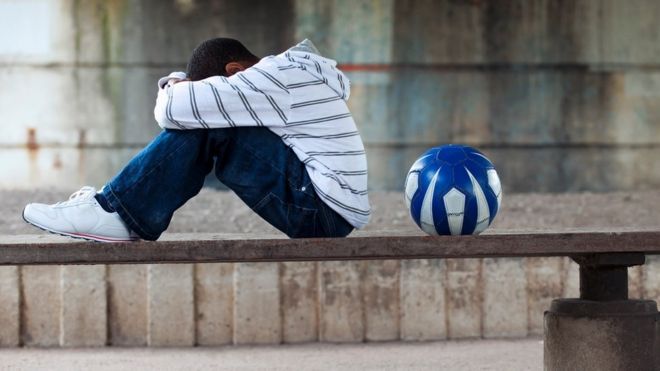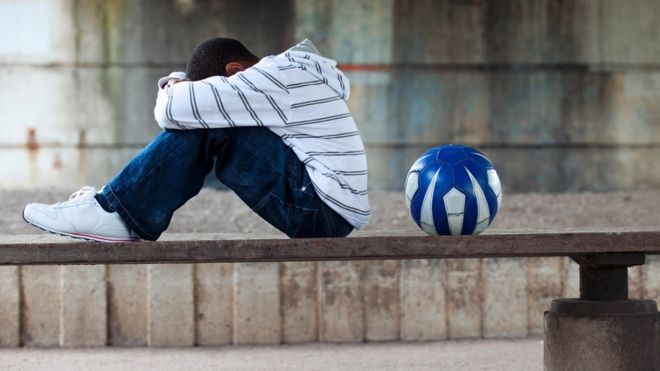
More than 100 child rapes with online links took place in England and Wales in the last year, police figures obtained by the NSPCC show.
Data from 38 out of 43 police forces suggested the internet was used in 3,186 sexual offences against children in the year to 31 March, said the NSPCC – more than eight a day.
This is the first year police have had to identify internet-related abuse.
More than 270 offences involved children under the age of 10.
The data showed that a one-year-old baby was among the thousands of child victims of sex abuse that involved the internet.
The offences included inciting children to take part in a sexual act, grooming victims before meeting them and live-streaming abuse.
‘Tip of iceberg’
It became mandatory on 1 April 2015 for police to “cyber flag” sex abuse cases with an online element. But the NSPCC reported that a “small number” of police forces did not know about the Home Office scheme or were not using it.
The NSPCC obtained the information through a Freedom of Information (FoI) request, which asked for the number of recorded crimes against under-18s under the Sexual Offences Act 2003 that had a “cyber flag” attached to them.
BBC home affairs correspondent Danny Shaw said the true number of sexual offences was likely to be “far higher” because six UK police forces, including the Metropolitan Police and Police Service of Northern Ireland, did not reply to the FoI, and because the figures did not include crimes that were not reported.
In Scotland – where the legislation is different to England and Wales – the number of adults targeting children with indecent communications online or via text increased by 60% from 2013/14 to 2014/15.
Data supplied by the Police Service of Northern Ireland to the NSPCC showed there were 139 recorded sex offences against children that involved the internet in the 12-month period.
Children’s Commissioner for England Anne Longfield said: “Sadly, these concerning figures may be just the tip of the iceberg, because children rarely tell someone that they are being abused – often through fear of the consequences or because they cannot put their experiences into words.
“Successful police operations show that online sexual offenders use sophisticated methods to target, trick and groom children, and may target hundreds of children at a time.
“The internet is increasingly integral to children’s lives and they need to be educated about the risks, as well as how to report suspicious behaviour.”
Tips to help children stay safe online
Have conversations about online safety little and often
Show an interest in what your child does online
Know who it is that your child is talking to online
Set rules and agree boundaries
Make sure that content is age-appropriate
Use parental controls to filter, restrict, monitor or report content
Check they know how to use privacy settings and reporting tools
Source: NSPCC
The National Police Chiefs’ Council says internet-related abuse was one of the factors behind an estimated 80% increase in the reporting of child sex offences in the last four years.
Chief Constable Simon Bailey from the council said: “More research is needed to understand these trends and whether they reflect greater confidence among victims to come forward, better identification by professionals, or an actual increase in offending.”
Peter Wanless, NSPCC chief executive, said: “It’s clear that a large volume of sexual assaults and rapes of children have involved the use of the internet – for example by grooming victims before abusing them offline, or live-streaming the abuse.
“We know grooming is on the rise because children are increasingly telling our ChildLine service how they are being targeted online.
“Predatory adults posing as children try to meet them or blackmail them into meeting up or performing sexual acts on webcams, which obviously terrifies them and can leave some feeling suicidal.”
Mr Wanless said he hoped the statistics highlighted how police were under “increasing pressure” to combat online offences.
“We have to ensure they have the resources and training to make them fit for tackling crime in the 21st Century,” he said. “And the government must make mental health support available to every child who has endured abuse.”
The Home Office says an offence should be flagged as having been committed online when the reporting officer believes that, on the balance of probability, the offence was committed, in full or in part, through a computer, computer network or other computer-enabled device, such as smartphones or tablets.
This includes sending or receiving emails, the use of social networking sites such as Facebook, Twitter or chat rooms and messaging services.
Data from 38 out of 43 police forces suggested the internet was used in 3,186 sexual offences against children in the year to 31 March, said the NSPCC – more than eight a day.
This is the first year police have had to identify internet-related abuse.
More than 270 offences involved children under the age of 10.
The data showed that a one-year-old baby was among the thousands of child victims of sex abuse that involved the internet.
The offences included inciting children to take part in a sexual act, grooming victims before meeting them and live-streaming abuse.
‘Tip of iceberg’
It became mandatory on 1 April 2015 for police to “cyber flag” sex abuse cases with an online element. But the NSPCC reported that a “small number” of police forces did not know about the Home Office scheme or were not using it.
The NSPCC obtained the information through a Freedom of Information (FoI) request, which asked for the number of recorded crimes against under-18s under the Sexual Offences Act 2003 that had a “cyber flag” attached to them.
BBC home affairs correspondent Danny Shaw said the true number of sexual offences was likely to be “far higher” because six UK police forces, including the Metropolitan Police and Police Service of Northern Ireland, did not reply to the FoI, and because the figures did not include crimes that were not reported.
In Scotland – where the legislation is different to England and Wales – the number of adults targeting children with indecent communications online or via text increased by 60% from 2013/14 to 2014/15.
Data supplied by the Police Service of Northern Ireland to the NSPCC showed there were 139 recorded sex offences against children that involved the internet in the 12-month period.
Children’s Commissioner for England Anne Longfield said: “Sadly, these concerning figures may be just the tip of the iceberg, because children rarely tell someone that they are being abused – often through fear of the consequences or because they cannot put their experiences into words.
“Successful police operations show that online sexual offenders use sophisticated methods to target, trick and groom children, and may target hundreds of children at a time.
“The internet is increasingly integral to children’s lives and they need to be educated about the risks, as well as how to report suspicious behaviour.”
Tips to help children stay safe online
Have conversations about online safety little and often
Show an interest in what your child does online
Know who it is that your child is talking to online
Set rules and agree boundaries
Make sure that content is age-appropriate
Use parental controls to filter, restrict, monitor or report content
Check they know how to use privacy settings and reporting tools
Source: NSPCC
The National Police Chiefs’ Council says internet-related abuse was one of the factors behind an estimated 80% increase in the reporting of child sex offences in the last four years.
Chief Constable Simon Bailey from the council said: “More research is needed to understand these trends and whether they reflect greater confidence among victims to come forward, better identification by professionals, or an actual increase in offending.”
Peter Wanless, NSPCC chief executive, said: “It’s clear that a large volume of sexual assaults and rapes of children have involved the use of the internet – for example by grooming victims before abusing them offline, or live-streaming the abuse.
“We know grooming is on the rise because children are increasingly telling our ChildLine service how they are being targeted online.
“Predatory adults posing as children try to meet them or blackmail them into meeting up or performing sexual acts on webcams, which obviously terrifies them and can leave some feeling suicidal.”
Mr Wanless said he hoped the statistics highlighted how police were under “increasing pressure” to combat online offences.
“We have to ensure they have the resources and training to make them fit for tackling crime in the 21st Century,” he said. “And the government must make mental health support available to every child who has endured abuse.”
The Home Office says an offence should be flagged as having been committed online when the reporting officer believes that, on the balance of probability, the offence was committed, in full or in part, through a computer, computer network or other computer-enabled device, such as smartphones or tablets.
This includes sending or receiving emails, the use of social networking sites such as Facebook, Twitter or chat rooms and messaging services.


